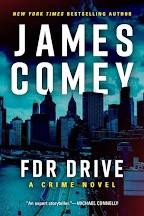Author: James Comey
Published: May 20, 2025 by Mysterious Press
Format: Kindle, 336 Pages
Genre: Thriller
Source: My thanks to Netgalley and the Publisher for the opportunity to read an advanced copy of this book.
Series: Nora Carleton #3
Blurb: A threat is building in the city, with far right extremism powered by internet demagogues and funded by shadowy organizations. Together with legendary investigator Benny Dugan and aided by colleagues at the FBI, Nora builds a case against the key players in this burgeoning movement, arguing before a jury that some speech is actually a deadly crime. But the menace taking root is far bigger than any courtroom, and as the militants target an upcoming United Nations rally, Nora and her team must race to disrupt the plans and minimize casualties.
My Opinion: FDR Drive is not a book you pick up for light, casual reading. It’s the kind you settle in for with a cup of coffee, ready to navigate the corridors of legal and political intrigue. And yes, I understand why some readers may balk at his work; the author himself carries enough baggage to trigger strong reactions. But setting that aside, if you’ve been following the Nora Carleton series, this one pulls you in from the first chapters. The tension is immediate, the stakes high, and before you know it, you’re flipping pages deep into the night.
Some criticize the book for being too complicated and too dense. That, I don’t understand. If you pick up a political-legal thriller from someone who’s been a power insider, it’s fair to expect complexity. Comey doesn’t spoon-feed; he expects the reader to keep up. And while I may not be a lawyer, I’ve watched enough Law & Order to hold my own and this book certainly tests that focus.
The real heart of FDR Drive, though, is the dilemma it presents: Where does free speech end, and culpability begin? The novel threads together real-world concerns about podcasters being charged with incitement, existential threats, and online radicalization. It forces the reader to ask tough questions: should a podcaster be held responsible for the actions of their audience? If someone names a name, drops an address, or expresses outrage, does that implicate them in the act that follows? And what about the puppet masters behind the scenes, the people who feed the information -- are they just as guilty? These are questions with no easy answers, ones that could spark heated discussions in a book club, assuming you’re all still on speaking terms by the end.
By the third book in the series, Nora Carleton, and the characters around her feel like people you want to see make it to the next day. This isn’t a simple read. It demands patience, attention, and a willingness to wade through moral complexity. But if you’re up for the challenge, FDR Drive delivers a thought-provoking, layered narrative that sticks with you long after the final page.
My Opinion: FDR Drive is not a book you pick up for light, casual reading. It’s the kind you settle in for with a cup of coffee, ready to navigate the corridors of legal and political intrigue. And yes, I understand why some readers may balk at his work; the author himself carries enough baggage to trigger strong reactions. But setting that aside, if you’ve been following the Nora Carleton series, this one pulls you in from the first chapters. The tension is immediate, the stakes high, and before you know it, you’re flipping pages deep into the night.
Some criticize the book for being too complicated and too dense. That, I don’t understand. If you pick up a political-legal thriller from someone who’s been a power insider, it’s fair to expect complexity. Comey doesn’t spoon-feed; he expects the reader to keep up. And while I may not be a lawyer, I’ve watched enough Law & Order to hold my own and this book certainly tests that focus.
The real heart of FDR Drive, though, is the dilemma it presents: Where does free speech end, and culpability begin? The novel threads together real-world concerns about podcasters being charged with incitement, existential threats, and online radicalization. It forces the reader to ask tough questions: should a podcaster be held responsible for the actions of their audience? If someone names a name, drops an address, or expresses outrage, does that implicate them in the act that follows? And what about the puppet masters behind the scenes, the people who feed the information -- are they just as guilty? These are questions with no easy answers, ones that could spark heated discussions in a book club, assuming you’re all still on speaking terms by the end.
By the third book in the series, Nora Carleton, and the characters around her feel like people you want to see make it to the next day. This isn’t a simple read. It demands patience, attention, and a willingness to wade through moral complexity. But if you’re up for the challenge, FDR Drive delivers a thought-provoking, layered narrative that sticks with you long after the final page.


No comments:
Post a Comment